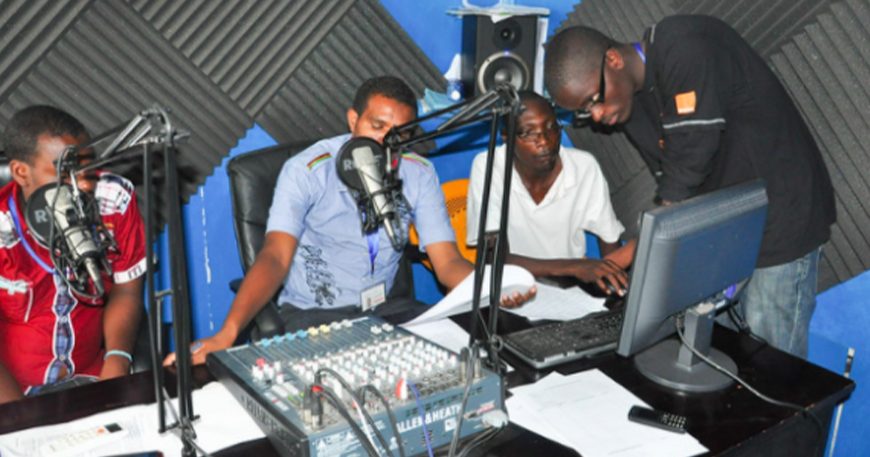Radio ratego is a community FM station broadcasting from Siaya county on a frequency of 98.9 that covers the wider Siaya and some parts of Kisii. The station has diverse programs that encompasses all ages in the areas of entertainment information and education. Umoja Radio for peace, a program under Civil Peace service in collaboration with Code For Africa recently undertook content production training targeting local journalists at the station in enhancing their capacities in radio production as well as fact-checking and verification of information. The Umoja team had a little chat with one of the Ratego staff after the training;
Name: Christine Odhiambo
Community Radio: Ratego FM
Role: Programs presenter
How do you define your role at Ratego? : I am a presenter. I also do mid-morning program and news briefs in between 10 am and 12 noon.
What does Ratego and Chuny Piny mean? : Ratego is a Luo name that means ‘a Hero’ Chuny Piny means ‘the heart of the people’
Why Community Radio? I chose community radio because I have been having an interest in working passionately for the community. I have the courage of working for the community. I simply have the interest of my community at heart
What’s your opinion on fake news: Fake news has affected me. I have that experience. There was a time I was about to go on air with a piece of story that looked so real. Unfortunately, it wasn’t the case. I dropped it after I was alerted by my colleagues. Minutes before the top of the hour.
What’s your most exciting experience in community radio? I was a presenter in Pacho Radio before joining Ratego. And alas! All my listeners followed me to Ratego. They usually call me on my show. Even for those who can’t access the radio frequency, they just call to inquire about the topic that I am tackling and they participate in the program even without listening.
What’s your take on the role of KCOMNET in capacity building of community Radios? It is my first time to learn about KCOMNET because I have never participated in any KCOMNET training before. But all the same am so inspired. I feel like KCOMNET can still d a lot in terms of capacity building If they increase the frequency of grassroot engagements with community radios.
How can you describe your audience: My audience are the best. To me they are my bosses. I am there for them. They have given me a conducive atmosphere and confidence as a journalist in as much as I don’t see them they always contribute to my program. They are very positive and so engaging.
What’s your most embarrassing moment on radio: One caller during a live program started seducing me on air. To me this was so embarrassing since I got puzzled on how my listeners would depict me.
How can you describe Ratego FM programs: They are so engaging and they cut across all age groups. Everybody’s interest is involved.
When we talk of ‘Community Radio’ what’s your understanding of it?: Its community based. Key owners and proprietors are the community members. Simply put, the back bone is community
What has been your biggest challenge as a community radio journalist: Working as a volunteer. I have personal life. I have bills to meet. Financially automatically I get numerous challenges because I don’t earn and at the same time I have to deliver on my duties. Basically challenge of survival. But this is common phenomena in community radios.
Where do you see the future of community radios: What I have known and for the years that I have worked with community radios, am so eager and anticipating that in the coming years if community radios continue to partner for a common course, community radios will emerge the best in as far as fostering social change is concerned. In most cases, community radios are real unless those which experiences some level of political interference
What’s your biggest fear as a community radio journalist? : My safety. At community radio I believe that am working for the community and they must be informed in all aspects and there comes a time where you feel that there is something that has happened and you have to honor your duty to inform but then again how safe are you?
What key Interventions can you suggest for community radios: They should be recognized as those organs that are working hand in hand with the citizens for positive social change. The government acknowledges and support them and even the journalists who are working there.
Christine Odhiambo was one of the two radio journalists at ratego FM who were awarded Pesa Check T-shirts for scoring highest points in Fact Checking random quize.




